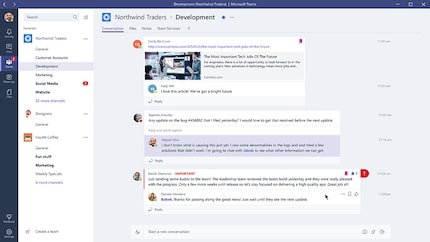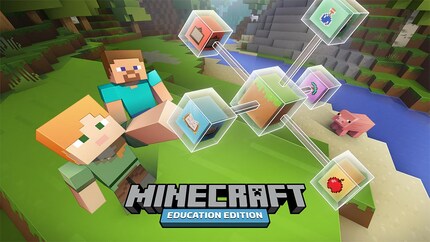
Product test
Chrome OS - So Bitzli Linux
by Dominik Bärlocher

The Microsoft press conference ended a few minutes ago. As well as taking a swipe at Apple, the manufacturer promised to digitalise the classroom and presented a new device: the Surface Laptop.
The rumour mill has been churning for months. Which devices will Microsoft present? What will they be able to do? Is the Macbook killer coming? Now there is certainty on all questions except the last one. Because whether Microsoft manages to overtake the Macbook with its Surface products will not be decided by technology or design, but by customers. So I can only tell you what was said at the Microsoft event.
At 3.30 pm Zurich time, Satya Nadella, CEO of Microsoft, stands in front of a small audience and the webcams. He talks about his youth in India and tells an anecdote about his grandfather and great-uncle: because the economic situation did not allow otherwise, only one of them went to school. From this, he derives the thrust of his company. Microsoft is all about the fact that society is changing. Technological possibilities not only determine the economic fortunes of a society, but also the education system. This is where Microsoft wants to start, with creativity and the so-called "democratisation of educational opportunities".
Pupils need to be prepared for the digital future. The so-called STEM fields must be introduced into the curriculum at an earlier stage, STEM, i.e. "Science, Technology, Engineering, and Mathematics", must be broadened and be accessible to all, regardless of the student's economic background or any learning difficulties such as dyslexia.

For dyslexics in particular, Microsoft has created a learning system that uses simple means to simplify and personalise the process of learning to read. The computer highlights the words on the screen in high contrast and separates them into syllables. This enables dyslexics - according to the dyslexic children in the recorded clip - to grasp "big words" and thus find an alternative way to enjoy reading.
Terry Myerson, Executive Vice President of the Windows and Devices Group, takes over. He explains how he is inspired by these children. The company starts in kindergarten and accompanies the pupils throughout their school career, because "technology is the first language that children learn". Windows is the first choice because so much can be plugged in. No doubt a dig at Apple and the systematic elimination of ports on both the iPhone and the MacBook Pro.
He introduces a new version of Windows. Windows 10 S, comparable to Chrome OS. "It's the soul of Windows," he says. The operating system is a stripped-down version of its big brother, Windows 10, and is identical to it down to the last detail. A new standard desktop image is the biggest visual innovation. In order to maintain a certain level of security, only apps from the Windows Store run on the device. There is an option to install apps from third-party sources. Microsoft Office is integrated into the store. Open interfaces such as Arduino will also be included in the store. Peripheral devices that teachers can use individually will also be supported.

Invented by Markus Persson, aka Notch, Minecraft has taken the hearts of gamers by storm. The open-world game in which anything can be built out of cubes, from a house to the Harry Potter school Hogwarts or a fully functional Mars base. These ideas are taken up by Deirdre Quarnstrom, Senior Director XBox, and her team. The result: Minecraft Education Edition.
The aim is to teach pupils about programming in a playful cube environment. The engine supports Tynker, a Lego-like programming suite that allows students to assemble code in blocks. Advanced users can also use a JavaScript console.
Panos Panay, Corporate Vice President of Devices at Microsoft, talks for a long time before he finally gets to the point. He mentions more and more often that Surface Pro customers are asking for more computing power. It feels like an eternity before he finally says the words: "This is the Surface Laptop."
The device known in the rumours as "London" attracted a great deal of interest from the very first mention. It is said to be completely cloud-based. A kind of Chromebook then? In other words, an ultra-light OS that does nothing other than launch a browser?
The target group is clear: lifestyle-conscious people and, to put it aggressively, Macbook users. Because it has been clear to observers of Microsoft for a while now: the company no longer wants to be seen as "the uncool". Where Apple has been focussing on design for what feels like an eternity, Microsoft has so far only focused on the Windows operating system, but not on its own devices. This has changed with the Surface series. Suddenly, Microsoft devices are not only functional, but can also look good. The device referred to in rumours as the "London", officially known simply as the Surface Laptop, is the latest step in this direction.
The design may not reinvent the wheel, a simple clamshell design, but the execution makes up for a lot. The device has just a few ports. Where Apple caused trouble with its latest Macbook Pro by abolishing all ports except for a few USB C-type plugs, "London" offers a USB 3.0 port, a Display Port Connector, a headphone jack and a Surface Dock Connector, "London" offers all the connection options that at least theoretically allow a user to be fully productive.
The Surface Laptop has a touchscreen, which combines the best features of a tablet and a laptop. The keyboard is covered in Alcantara fabric, like the previous Surface Two-in-Ones. Panos Panay says that the device should feel warm and soft.
Panos Panay presses the new device into the hand of a MacBook user. It will be available in red, silver, grey-black and blue. The screen aspect ratio is 3:2, which makes one thing very clear: no or only very, very thin edges. This gives the 13.5" laptop the usable screen area of a standard 14" laptop. The device will be compatible with all Surface peripherals.
The new Windows 10 S operating system gets in the way of the whole "latest Windows" thing. When Windows 10 was still new, Microsoft employees Jerry Nixon said that Win 10 will be "the last Windows". Almost true. Because although Windows 10 S bears the name of the last version of Windows, it is a completely different building block. It only runs Universal Windows Platform (UWP) apps. This means that only apps from the Windows App Store will run on it, similar to the Apple model. The advantage of the apps is that they can run in a desktop environment as well as on Windows' own operating system for smartphones without having to be rewritten.
The Surface Laptop has the SSD hard drive permanently installed on the mainboard. In addition to the raw system performance of the i7 or i5 processors, this should ensure a particularly long service life and weeks of standby time as well as fast login and boot sequences. Panos Panay claims that the Surface Laptop is faster than the current MacBook Pro.
However, the "London" can be upgraded to Windows 10, turning it into a fully functional laptop. Thanks to this setup and the low price for the entry-level models, which is repeatedly mentioned between the lines, the device is also attractive for schools.
Unfortunately, Microsoft has just informed us that only the Platinum colour version of the Surface Laptop will be available at the moment. As soon as we know whether we will also be able to offer the other colours, we will of course let you know.
Journalist. Author. Hacker. A storyteller searching for boundaries, secrets and taboos – putting the world to paper. Not because I can but because I can’t not.
From the latest iPhone to the return of 80s fashion. The editorial team will help you make sense of it all.
Show all